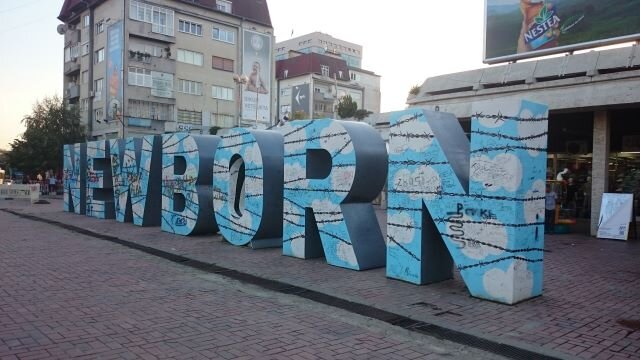
De facto states research unit
Newsroom
 The De Facto States Research Unit is happy to announce that its Sixth Emerging Scholars Workshop on De Facto States will be taking place online on 14-15 May 2026. The event is open to those working on de facto states, state recognition, secession, and related topics from the fields of political science, international relations, history, sociology, and neighbouring disciplines. The workshop will serve as a platform for introducing ongoing research projects, receiving feedback from peers, and establishing a network of emerging scholars working on the above-mentioned topics. We will discuss research projects in various stages in development, such as theses, whether in their initial stage or close to completion, book chapters or articles in progress, etc. Read the full call here.
The De Facto States Research Unit is happy to announce that its Sixth Emerging Scholars Workshop on De Facto States will be taking place online on 14-15 May 2026. The event is open to those working on de facto states, state recognition, secession, and related topics from the fields of political science, international relations, history, sociology, and neighbouring disciplines. The workshop will serve as a platform for introducing ongoing research projects, receiving feedback from peers, and establishing a network of emerging scholars working on the above-mentioned topics. We will discuss research projects in various stages in development, such as theses, whether in their initial stage or close to completion, book chapters or articles in progress, etc. Read the full call here.
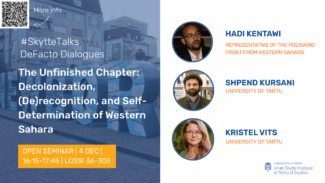 On 4 December 2025, the De Facto States Research Unit hosted the latest DeFacto Dialogues seminar, “The Unfinished Chapter: Decolonization, (De)recognition, and Self-Determination of Western Sahara.” The discussion featured Hadi Kentawi of the Polisario Front and Dr. Shpend Kursani of the Johan Skytte Institute, and was moderated by analyst Kristel Vits. Kentawi outlined the origins of the Western Sahara conflict, the realities of life in what he called “Africa’s last colony,” and the enduring connection of the Sahrawi people to their homeland, reflected even in the names of refugee camps in Algeria, where over 170,000 Sahrawis still live. He argued that Morocco’s proposal for autonomy under its sovereignty is incompatible with international law, contradicts previous UN Security Council resolutions guaranteeing Sahrawi self-determination, and lacks clarity regarding the actual degree of autonomy offered. Dr. Kursani examined why an increasing number of states—and now the UN Security Council through Resolution 2797 (31 October 2025)—have nonetheless begun supporting the autonomy plan, highlighting the erosion of international law since Donald Trump’s first presidency and the appeal of Morocco’s economic and security incentives. The event concluded with a discussion on international engagement in the conflict and the role of public diplomacy in the Polisario Front’s response to Resolution 2797.
On 4 December 2025, the De Facto States Research Unit hosted the latest DeFacto Dialogues seminar, “The Unfinished Chapter: Decolonization, (De)recognition, and Self-Determination of Western Sahara.” The discussion featured Hadi Kentawi of the Polisario Front and Dr. Shpend Kursani of the Johan Skytte Institute, and was moderated by analyst Kristel Vits. Kentawi outlined the origins of the Western Sahara conflict, the realities of life in what he called “Africa’s last colony,” and the enduring connection of the Sahrawi people to their homeland, reflected even in the names of refugee camps in Algeria, where over 170,000 Sahrawis still live. He argued that Morocco’s proposal for autonomy under its sovereignty is incompatible with international law, contradicts previous UN Security Council resolutions guaranteeing Sahrawi self-determination, and lacks clarity regarding the actual degree of autonomy offered. Dr. Kursani examined why an increasing number of states—and now the UN Security Council through Resolution 2797 (31 October 2025)—have nonetheless begun supporting the autonomy plan, highlighting the erosion of international law since Donald Trump’s first presidency and the appeal of Morocco’s economic and security incentives. The event concluded with a discussion on international engagement in the conflict and the role of public diplomacy in the Polisario Front’s response to Resolution 2797.
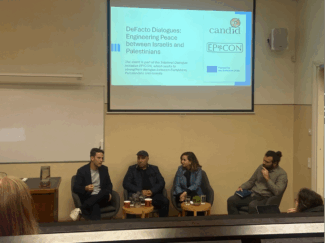 On October 8, 2025, the DeFacto Dialogues series hosted a compelling discussion titled Engineering Peace between Israelis and Palestinians, held in collaboration with the De Facto State Research Unit (University of Tartu) and the CANDID Foundation, as part of the EU-funded Trilateral Dialogue Initiative EPICON. Moderated by Dr. Shpend Kursani, the dialogue brought together Palestinian political activist Samer Sinijlawi, Israeli communication strategist and human rights activist Dan Sobovitz, and Israeli-Arab acitivist and former Deputy Chair of Knesset Ghaida Rinawie Zoabi to explore whether peace remains possible amid one of the most intractable and emotionally charged conflicts in modern history. Nearly two years after the Hamas attacks of October 7, 2023, and the ensuing war in Gaza, all three speakers reflected on the social, moral, and political transformations reshaping their societies. Rinawie Zoabi emphasized the complexity of dual identities among Palestinian citizens of Israel, simultaneously rooted in both national narratives, and called for greater European engagement to pressure Israel’s government toward implementing humanitarian and political reforms. Sinijlawi, tracing his personal journey from nationalist conviction to dialogue and empathy, argued that the conflict, far from being “the most complicated in the world,” is instead a tragic product of manipulation and dehumanization. True resolution, he maintained, depends on recognizing shared humanity rather than competing victimhood. Sobovitz, reflecting on his own ideological evolution from a settler upbringing to human rights advocacy, described the profound identity crisis facing many Israelis today: torn between pride in their nation’s resilience and shame at the ongoing violence in Gaza. Audience questions probed the roles of external actors, the impact of Israeli domestic politics, and the moral exhaustion of societies locked in mutual fear. The panelists agreed that peace will not emerge from within the current leadership but may be catalyzed by sustained international pressure and grassroots empathy. As Sinijlawi concluded, “We are not each other’s problem – we are each other’s solution.”
On October 8, 2025, the DeFacto Dialogues series hosted a compelling discussion titled Engineering Peace between Israelis and Palestinians, held in collaboration with the De Facto State Research Unit (University of Tartu) and the CANDID Foundation, as part of the EU-funded Trilateral Dialogue Initiative EPICON. Moderated by Dr. Shpend Kursani, the dialogue brought together Palestinian political activist Samer Sinijlawi, Israeli communication strategist and human rights activist Dan Sobovitz, and Israeli-Arab acitivist and former Deputy Chair of Knesset Ghaida Rinawie Zoabi to explore whether peace remains possible amid one of the most intractable and emotionally charged conflicts in modern history. Nearly two years after the Hamas attacks of October 7, 2023, and the ensuing war in Gaza, all three speakers reflected on the social, moral, and political transformations reshaping their societies. Rinawie Zoabi emphasized the complexity of dual identities among Palestinian citizens of Israel, simultaneously rooted in both national narratives, and called for greater European engagement to pressure Israel’s government toward implementing humanitarian and political reforms. Sinijlawi, tracing his personal journey from nationalist conviction to dialogue and empathy, argued that the conflict, far from being “the most complicated in the world,” is instead a tragic product of manipulation and dehumanization. True resolution, he maintained, depends on recognizing shared humanity rather than competing victimhood. Sobovitz, reflecting on his own ideological evolution from a settler upbringing to human rights advocacy, described the profound identity crisis facing many Israelis today: torn between pride in their nation’s resilience and shame at the ongoing violence in Gaza. Audience questions probed the roles of external actors, the impact of Israeli domestic politics, and the moral exhaustion of societies locked in mutual fear. The panelists agreed that peace will not emerge from within the current leadership but may be catalyzed by sustained international pressure and grassroots empathy. As Sinijlawi concluded, “We are not each other’s problem – we are each other’s solution.”
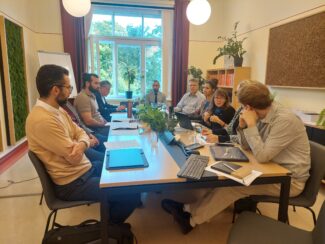 On 19 September, the De Facto States Research Unit hosted a workshop “The UNPO’s ‘Universal Declaration of the Rights of Peoples’: its context, content and implementation”, convened by Professor Fiona McConnell (St. Catherine’s College, Oxford) and Mercè Monje Cano (Unrepresented Nations and Peoples Organization). The workshop brought together those connected to the drafting of the Declaration, alongside scholars and rights practitioners to discuss the Declaration’s historical context, its positioning vis-à-vis international law and rights regimes, and its potential as an advocacy tool for unrepresented peoples.
On 19 September, the De Facto States Research Unit hosted a workshop “The UNPO’s ‘Universal Declaration of the Rights of Peoples’: its context, content and implementation”, convened by Professor Fiona McConnell (St. Catherine’s College, Oxford) and Mercè Monje Cano (Unrepresented Nations and Peoples Organization). The workshop brought together those connected to the drafting of the Declaration, alongside scholars and rights practitioners to discuss the Declaration’s historical context, its positioning vis-à-vis international law and rights regimes, and its potential as an advocacy tool for unrepresented peoples.
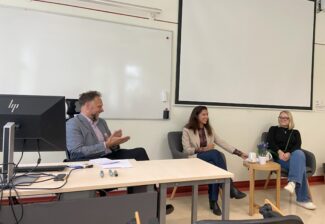 The latest DeFacto Dialogues on September 18, 2025 examined the Estonian roots and current role of the Unrepresented Nations and Peoples Organization (UNPO). Moderated by Dr. David Ilmar Lepasaar Beecher, the seminar featured Maaja Mäll, daughter of Dr. Linnart Mäll, and Mercè Monje Cano, Secretary General of the UNPO. Founded in The Hague in 1991 with the active participation of Estonian intellectuals, the UNPO emerged as a voice for nations and peoples excluded from the international system. Today, it represents more than 300 million people – minorities, indigenous communities, and unrecognized nations- working to defend rights, combat repression, and train activists. Monje Cano emphasized that the UNPO is an organization by and for marginalized peoples, serving as a bridge between communities and international institutions. Its General Assembly elects leadership, while the Secretariat raises cases of human rights abuses at the UN and regional bodies. Members often face intimidation when engaging with official forums, yet the UNPO remains committed to nonviolence and solidarity. Maaja Mäll reflected on the organization’s early years, highlighting the importance of preserving its historical memory as a guide for future strategy. Questions from the audience addressed membership criteria, sources of funding, and how the UNPO navigates internal divisions while resisting pressure from powerful states such as China, Pakistan, and Iran. Despite limited resources – membership fees form its main funding base – the UNPO continues to offer a platform for self-determination, stressing that territorial integrity cannot outweigh fundamental rights.
The latest DeFacto Dialogues on September 18, 2025 examined the Estonian roots and current role of the Unrepresented Nations and Peoples Organization (UNPO). Moderated by Dr. David Ilmar Lepasaar Beecher, the seminar featured Maaja Mäll, daughter of Dr. Linnart Mäll, and Mercè Monje Cano, Secretary General of the UNPO. Founded in The Hague in 1991 with the active participation of Estonian intellectuals, the UNPO emerged as a voice for nations and peoples excluded from the international system. Today, it represents more than 300 million people – minorities, indigenous communities, and unrecognized nations- working to defend rights, combat repression, and train activists. Monje Cano emphasized that the UNPO is an organization by and for marginalized peoples, serving as a bridge between communities and international institutions. Its General Assembly elects leadership, while the Secretariat raises cases of human rights abuses at the UN and regional bodies. Members often face intimidation when engaging with official forums, yet the UNPO remains committed to nonviolence and solidarity. Maaja Mäll reflected on the organization’s early years, highlighting the importance of preserving its historical memory as a guide for future strategy. Questions from the audience addressed membership criteria, sources of funding, and how the UNPO navigates internal divisions while resisting pressure from powerful states such as China, Pakistan, and Iran. Despite limited resources – membership fees form its main funding base – the UNPO continues to offer a platform for self-determination, stressing that territorial integrity cannot outweigh fundamental rights.
We are proud to share that our valued team member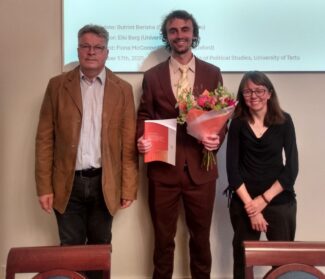 Butrint Berisha has successfully defended his doctoral thesis at the Johan Skytte Institute of Political Studies, University of Tartu on 17 September 2025. His dissertation, “Exploring the Role of Civil Society Organisations (CSOs) in Foreign Relations of De Facto States: A Comparative Analysis of Kosovo, Palestine and Taiwan,” sheds new light on the scope and variation of CSOs’ international engagement and their role among non-state actors.
Butrint Berisha has successfully defended his doctoral thesis at the Johan Skytte Institute of Political Studies, University of Tartu on 17 September 2025. His dissertation, “Exploring the Role of Civil Society Organisations (CSOs) in Foreign Relations of De Facto States: A Comparative Analysis of Kosovo, Palestine and Taiwan,” sheds new light on the scope and variation of CSOs’ international engagement and their role among non-state actors.
Warm congratulations to Dr. Berisha on this well-deserved achievement!
 The latest DeFacto Dialogues webinar on February 5, 2025 examined Transnistria’s future and potential reintegration with Moldova. Moderated by Kristel Vits (University of Tartu), the event featured Dr. Anatolii Dirun, a Transnistrian political scientist, and Kamil Całus, a Senior Research Fellow at OSW. Transnistria, home to 300,000 people—100,000 of whom are pensioners—functions under an oligarchic system with little competition. Całus highlighted the fact that the Transnistrian economy depends on two pillars: subsidized Russian gas from Gazprom via Ukraine and access to the EU market through Moldova’s agreements with the EU. Russia’s war on Ukraine as a turning point was highlighted by Kristel Vits. Dr. Dirun noted that changes actually began in 2014 with Ukraine’s shift in leadership and the annexation of Crimea. The dominant business conglomerate, Sheriff, fears forced reintegration if Russia succeeds, while Moscow distrusts Sheriff’s independent stance. Moldova has not actively pursued reintegration, fearing Russian retaliation. Lacking resources and a long-term strategy, Chisinau has left the conflict frozen, with its resolution tied to the broader European security landscape. In the informative discussion, the speakers highlighted that the gas crisis has deepened the economic crisis. Tiraspol previously sold electricity, produced with Russian gas, to Chisinau. For now, Transnistria avoids a humanitarian crisis due to EU-funded gas purchases, but industries struggle without natural gas. On Transnistria’s future, opinions diverge. Całus sees reintegration as inevitable, while Dirun disagrees. With no plan from Chisinau and Russian troops symbolizing Moscow’s presence, the region’s fate remains uncertain.
The latest DeFacto Dialogues webinar on February 5, 2025 examined Transnistria’s future and potential reintegration with Moldova. Moderated by Kristel Vits (University of Tartu), the event featured Dr. Anatolii Dirun, a Transnistrian political scientist, and Kamil Całus, a Senior Research Fellow at OSW. Transnistria, home to 300,000 people—100,000 of whom are pensioners—functions under an oligarchic system with little competition. Całus highlighted the fact that the Transnistrian economy depends on two pillars: subsidized Russian gas from Gazprom via Ukraine and access to the EU market through Moldova’s agreements with the EU. Russia’s war on Ukraine as a turning point was highlighted by Kristel Vits. Dr. Dirun noted that changes actually began in 2014 with Ukraine’s shift in leadership and the annexation of Crimea. The dominant business conglomerate, Sheriff, fears forced reintegration if Russia succeeds, while Moscow distrusts Sheriff’s independent stance. Moldova has not actively pursued reintegration, fearing Russian retaliation. Lacking resources and a long-term strategy, Chisinau has left the conflict frozen, with its resolution tied to the broader European security landscape. In the informative discussion, the speakers highlighted that the gas crisis has deepened the economic crisis. Tiraspol previously sold electricity, produced with Russian gas, to Chisinau. For now, Transnistria avoids a humanitarian crisis due to EU-funded gas purchases, but industries struggle without natural gas. On Transnistria’s future, opinions diverge. Całus sees reintegration as inevitable, while Dirun disagrees. With no plan from Chisinau and Russian troops symbolizing Moscow’s presence, the region’s fate remains uncertain.
 Save the dates for the Fifth Emerging Scholars Workshop on De Facto States! Organized by our research unit, we cordially invite applications from postgraduate students and early career scholars for our workshop. The call is open to those working on de facto states, state recognition, secession, and related topics from the fields of political science, international relations, history, sociology, and neighbouring disciplines. Since 2021, the Emerging Scholars Workshops on De Facto States have brought together new generations of scholars working on topics related to de facto states. These events allow emerging scholars to showcase their research, exchange ideas, and to build supportive peer networks. The format emphasises peer learning both through presenting, but also in leading discussions. Connections created through these workshops have led to various interactions and projects. The event will be held online on 10-11 April 2025. Please read the full call here, and submit your applications on Google Forms.
Save the dates for the Fifth Emerging Scholars Workshop on De Facto States! Organized by our research unit, we cordially invite applications from postgraduate students and early career scholars for our workshop. The call is open to those working on de facto states, state recognition, secession, and related topics from the fields of political science, international relations, history, sociology, and neighbouring disciplines. Since 2021, the Emerging Scholars Workshops on De Facto States have brought together new generations of scholars working on topics related to de facto states. These events allow emerging scholars to showcase their research, exchange ideas, and to build supportive peer networks. The format emphasises peer learning both through presenting, but also in leading discussions. Connections created through these workshops have led to various interactions and projects. The event will be held online on 10-11 April 2025. Please read the full call here, and submit your applications on Google Forms.
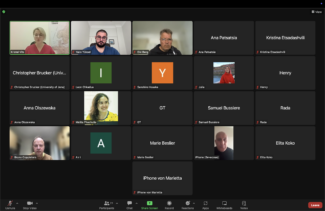 This installment in our DeFacto Dialogues on November 28, 2024 focused on the latest political crisis in Abkhazia which erupted over recent agreements with Russia. Moderated by our own Kristel Vits, the speakers were Professor Emeritus Bruno Coppieters (Vrije Universiteit Brussels) and Abkhaz scholar and politician Viacheslav Chirikba. The informative discussion took off with a summary of the Abkhazian conflict and the current situation by Kristel Vits. Professor Bruno Coppieters highlighted the facts that while both Georgia and Abkhazia have nationalist agendas in the frozen conflict, there are realized and unrealized goals of the nationalists on each side. Furthermore, he emphasized that although the Abkhazians are unable to find an alternative to Russian support, possible resolutions to the conflict are also far off in the distance with minimal engagement from the rest of the world. Viacheslav Chirikba enlightened the audience with much appreciated insights directly from Abkhazia. He argued that Russia is not involved in the internal affairs of Abkhazia and the latest crisis was motivated financially rather than politically. He further stated that the now former president Aslan Bzhania angered and alienated many spheres of society, including even his supporters, resulting in his ousting. The colorful discussion carried on with the mention of the opposition’s strength in the recent protests but its currently division into many parties. Chirikba stated that he expects them to come together before the elections scheduled for February 15. To finalize, he agreed with Bruno, in confirming that there are no current alternatives for Abkhazia other than Russia. He further emphasized that they had no real partners on the Georgian side to discuss vital issues, and also that a confederation with Georgia is unthinkable.
This installment in our DeFacto Dialogues on November 28, 2024 focused on the latest political crisis in Abkhazia which erupted over recent agreements with Russia. Moderated by our own Kristel Vits, the speakers were Professor Emeritus Bruno Coppieters (Vrije Universiteit Brussels) and Abkhaz scholar and politician Viacheslav Chirikba. The informative discussion took off with a summary of the Abkhazian conflict and the current situation by Kristel Vits. Professor Bruno Coppieters highlighted the facts that while both Georgia and Abkhazia have nationalist agendas in the frozen conflict, there are realized and unrealized goals of the nationalists on each side. Furthermore, he emphasized that although the Abkhazians are unable to find an alternative to Russian support, possible resolutions to the conflict are also far off in the distance with minimal engagement from the rest of the world. Viacheslav Chirikba enlightened the audience with much appreciated insights directly from Abkhazia. He argued that Russia is not involved in the internal affairs of Abkhazia and the latest crisis was motivated financially rather than politically. He further stated that the now former president Aslan Bzhania angered and alienated many spheres of society, including even his supporters, resulting in his ousting. The colorful discussion carried on with the mention of the opposition’s strength in the recent protests but its currently division into many parties. Chirikba stated that he expects them to come together before the elections scheduled for February 15. To finalize, he agreed with Bruno, in confirming that there are no current alternatives for Abkhazia other than Russia. He further emphasized that they had no real partners on the Georgian side to discuss vital issues, and also that a confederation with Georgia is unthinkable.
 Between October 16-19, 2024, Eiki Berg was in Regensburg, Germany to give a lecture titled “Digging in the Dirt: ‘No War, No Peace and Not Too Much Killing’” as part of the “War. Peace. Security.” lecture series. Based on knowledge provided through our ETAG-funded research project. Eiki explained the state of frozenness seen in some conflicts around the world and the three-tiered approach developed by our research unit. Emphasizing the both peaceful and violent nature of frozen conflicts, internal and external factors which might still push frozen conflicts into peace and violence were discussed. He further elaborated on an analytic framework which builds on incomplete secessions where de facto states are involved and interacting with other actors. The first tier of the research focuses on internal legitimacy, the second tier scrutinizes the position of the de facto states in relation to the triad of ‘patron,’ ‘parent,’ and ‘third parties,’ and the third tier highlights the relationship between other actors which the de facto state has no control on. In light of this framework, how the proposed three-tier analysis can explain why some frozen conflicts continue to endure (status quo), others get resolved (peace agreement), and a few burst into large-scale violence (war) was pondered upon. This trip was made possible with funding from Estonian Research Council (PRG1798).
Between October 16-19, 2024, Eiki Berg was in Regensburg, Germany to give a lecture titled “Digging in the Dirt: ‘No War, No Peace and Not Too Much Killing’” as part of the “War. Peace. Security.” lecture series. Based on knowledge provided through our ETAG-funded research project. Eiki explained the state of frozenness seen in some conflicts around the world and the three-tiered approach developed by our research unit. Emphasizing the both peaceful and violent nature of frozen conflicts, internal and external factors which might still push frozen conflicts into peace and violence were discussed. He further elaborated on an analytic framework which builds on incomplete secessions where de facto states are involved and interacting with other actors. The first tier of the research focuses on internal legitimacy, the second tier scrutinizes the position of the de facto states in relation to the triad of ‘patron,’ ‘parent,’ and ‘third parties,’ and the third tier highlights the relationship between other actors which the de facto state has no control on. In light of this framework, how the proposed three-tier analysis can explain why some frozen conflicts continue to endure (status quo), others get resolved (peace agreement), and a few burst into large-scale violence (war) was pondered upon. This trip was made possible with funding from Estonian Research Council (PRG1798).
 DeFacto Dialogues is back with its eighth edition. The latest session titled “Quest for Representing the Unrepresented Selves in World Politics” took place at Johan Skytte Institute of Political Studies on September 30, 2024, with the participation of Christopher Brucker (Friedrich-Schiller Universität Jena) and Märt Läänemets (Estonian Academy of Security Sciences). The discussion, moderated by our own Eiki Berg, started by highlighting the past and present activities of Unrepresented Nations and Peoples Organization (UNPO) and its role in organizing and representing unrepresented peoples around the globe. The broader implications of these efforts, particularly in relation to addressing self-determination in global politics were scrutinized. The main question of “does the UNPO influence the way self-determination issues are managed on the world stage was addressed during the exciting and informative panel.
DeFacto Dialogues is back with its eighth edition. The latest session titled “Quest for Representing the Unrepresented Selves in World Politics” took place at Johan Skytte Institute of Political Studies on September 30, 2024, with the participation of Christopher Brucker (Friedrich-Schiller Universität Jena) and Märt Läänemets (Estonian Academy of Security Sciences). The discussion, moderated by our own Eiki Berg, started by highlighting the past and present activities of Unrepresented Nations and Peoples Organization (UNPO) and its role in organizing and representing unrepresented peoples around the globe. The broader implications of these efforts, particularly in relation to addressing self-determination in global politics were scrutinized. The main question of “does the UNPO influence the way self-determination issues are managed on the world stage was addressed during the exciting and informative panel.
 The De Facto States Research Unit hosted the Unrepresented Nations and Peoples Organization (UNPO) delegation consisting of the General Secretary Mercè Monje Cano, Fiona McConnell and Alex Manby for the first time on September 25, 2024. During the inspiring meeting, discussions on areas of academic and policy level interests of both sides and possibilities of mutual cooperation between the UNPO, its academics and members of our team took place. The general consensus in the meeting was that various fruitful avenues of possible future cooperation exist. We are looking forward to working more closely with the UNPO, providing expertise where needed and improving our own knowledge and reach through our interactions. Our special thanks go to Märt Laanemets, a former activist at UNPO, for making the meeting possible.
The De Facto States Research Unit hosted the Unrepresented Nations and Peoples Organization (UNPO) delegation consisting of the General Secretary Mercè Monje Cano, Fiona McConnell and Alex Manby for the first time on September 25, 2024. During the inspiring meeting, discussions on areas of academic and policy level interests of both sides and possibilities of mutual cooperation between the UNPO, its academics and members of our team took place. The general consensus in the meeting was that various fruitful avenues of possible future cooperation exist. We are looking forward to working more closely with the UNPO, providing expertise where needed and improving our own knowledge and reach through our interactions. Our special thanks go to Märt Laanemets, a former activist at UNPO, for making the meeting possible.
 On September 12, 2024, Eiki Berg spoke at the “Arts of Survival in the Baltics” conference organized jointly by Centre for Geopolitics, Baltic Defense College and University of Tartu Center for Eurasian and Russian Studies, supported by the British Embassies in Tallinn and Riga. In his opening for the panel titled “Implications for Global Geopolitics and the World Order,” Eiki Berg focused on six points in seven minutes. The conversation opened by highlighting the importance of geography for offering a framework to understand strategic significance ascribed to various locations as more or less valuable and the highly fragmented and vulnerable nature of shatterbelts in cases of internal and external power shifts. The deeply informative discussion later switched how the core issues between the warring parties remain unresolved and that the “frozenness” of these conflicts can be understood as no war, no peace and minimal killing. In light of the previous point, the significance of shifts in global order in prompting movement towards violent or peaceful thawing of conflicts and why Russia is unlikely to abandon Moldova and Georgia’s breakaway territories despite its current limitations due to the war in Ukraine. He concluded by focusing on why the EU seems to be entrapped in the enlargement dilemma: while the exclusion of countries with unresolved territories push them back to Russia’s orbit, making conflict resolution conditional for accession presents opportunities for Russia to indirectly intervene and impose veto power through the back door.
On September 12, 2024, Eiki Berg spoke at the “Arts of Survival in the Baltics” conference organized jointly by Centre for Geopolitics, Baltic Defense College and University of Tartu Center for Eurasian and Russian Studies, supported by the British Embassies in Tallinn and Riga. In his opening for the panel titled “Implications for Global Geopolitics and the World Order,” Eiki Berg focused on six points in seven minutes. The conversation opened by highlighting the importance of geography for offering a framework to understand strategic significance ascribed to various locations as more or less valuable and the highly fragmented and vulnerable nature of shatterbelts in cases of internal and external power shifts. The deeply informative discussion later switched how the core issues between the warring parties remain unresolved and that the “frozenness” of these conflicts can be understood as no war, no peace and minimal killing. In light of the previous point, the significance of shifts in global order in prompting movement towards violent or peaceful thawing of conflicts and why Russia is unlikely to abandon Moldova and Georgia’s breakaway territories despite its current limitations due to the war in Ukraine. He concluded by focusing on why the EU seems to be entrapped in the enlargement dilemma: while the exclusion of countries with unresolved territories push them back to Russia’s orbit, making conflict resolution conditional for accession presents opportunities for Russia to indirectly intervene and impose veto power through the back door.
 Between July 28th and August 8th, 2024, the De Facto States Research Unit organized a comprehensive summer school in Tartu, titled “Secessionist and Statehood Bids in Times of Crisis.” As the processes of wars in Ukraine, Gaza and Nagorno-Karabakh are still unfolding, the significance of developing a comprehensive understanding of concepts and practices related to secessionism and their impact on the international order becomes even more emphasized. To guide prospective MA students and PhD candidates interested in secession, recognition, statehood and “frozen conflicts” Prof. Eiki Berg, along with Dr. Shpend Kursani and Dr. Ana Maria Albulescu highlighted the fundamental questions of secessionist conflicts to scrutinize the positions of de facto states in “frozen conflicts” and their agency. Possible responses to these questions were then sought through analyses of the politics of recognition, counter-secession strategies and engagement without recognition. Relying mostly on first-hand comparative research, our team members not only taught, generated discussions and encouraged independent work, but also organized movie screenings, a field trip to Narva and a simulation exercise where students gained first-hand experience of negotiation techniques. The summer school was funded by the Estonian Research Council (PRG1798).
Between July 28th and August 8th, 2024, the De Facto States Research Unit organized a comprehensive summer school in Tartu, titled “Secessionist and Statehood Bids in Times of Crisis.” As the processes of wars in Ukraine, Gaza and Nagorno-Karabakh are still unfolding, the significance of developing a comprehensive understanding of concepts and practices related to secessionism and their impact on the international order becomes even more emphasized. To guide prospective MA students and PhD candidates interested in secession, recognition, statehood and “frozen conflicts” Prof. Eiki Berg, along with Dr. Shpend Kursani and Dr. Ana Maria Albulescu highlighted the fundamental questions of secessionist conflicts to scrutinize the positions of de facto states in “frozen conflicts” and their agency. Possible responses to these questions were then sought through analyses of the politics of recognition, counter-secession strategies and engagement without recognition. Relying mostly on first-hand comparative research, our team members not only taught, generated discussions and encouraged independent work, but also organized movie screenings, a field trip to Narva and a simulation exercise where students gained first-hand experience of negotiation techniques. The summer school was funded by the Estonian Research Council (PRG1798).
 De Facto States Research Unit organised a panel on “De Facto States in the Horizon: Between Frozen and Boiling States of Being” at the 8th Annual Tartu Conference, hosted by the University of Tartu on 19-21 June, 2024. This event brought together experts in the field of de facto states research such as Ashley Humphrey (Federation University), Ramesh Ganohariti (Leiden University), Stefan Wolff (University of Birmingham), Nasia Hadjigeorgiou (UCLan Cyprus), Anne Hsiu-An Hsiao (National Chengchi University), Shpend Kursani and Eiki Berg (University of Tartu). The panel explored strategies employed in attempting to address frozen conflicts and brought various strands of literature together in proposing new approaches to analysing trajectories that frozen conflicts can take. In dealing with the above issues, the panel included diverse case studies, from the Russo-Ukrainian war and the Cypriot conflict to the renewed tensions in the Taiwan Strait.
De Facto States Research Unit organised a panel on “De Facto States in the Horizon: Between Frozen and Boiling States of Being” at the 8th Annual Tartu Conference, hosted by the University of Tartu on 19-21 June, 2024. This event brought together experts in the field of de facto states research such as Ashley Humphrey (Federation University), Ramesh Ganohariti (Leiden University), Stefan Wolff (University of Birmingham), Nasia Hadjigeorgiou (UCLan Cyprus), Anne Hsiu-An Hsiao (National Chengchi University), Shpend Kursani and Eiki Berg (University of Tartu). The panel explored strategies employed in attempting to address frozen conflicts and brought various strands of literature together in proposing new approaches to analysing trajectories that frozen conflicts can take. In dealing with the above issues, the panel included diverse case studies, from the Russo-Ukrainian war and the Cypriot conflict to the renewed tensions in the Taiwan Strait.
 The seventh edition of our DeFacto Dialogues titled “Hamas-Israel War in Gaza 7 Months Later” was held on May 7, 2024 in Johan Skytte Institute and simultaneously on Zoom. The guest speakers, Dahlia Scheindlin who is an international political and strategic consultant from Israel and Muhammad Shahada, a journalist based in Palestine, enlightened the audiences with their insightful comments on the current state of war and expert opinions on the domestic and international politics surrounding the sensitive issue. Some of the most prevalent topics included discussions on the course of the ongoing indirect negotiations between Hamas and Israel in Egypt, whether Israel can realistically achieve its goals of eradicating Hamas and from-the-ground opinions of Israelis and Palestinians on the past, present and the future of the conflict. Dahlia pointed out that she is not expecting the war to end soon, that Israel is trapped in this war because of how Netanyahu handled the domestic politics and narration of the issue, and that the level of trust of Israelis in Netanyahu is declining. Muhammad, not only agreed with our other speaker but also highlighted the change in Israeli discourses regarding negotiations with Hamas, stating that although Israel cannot reach its goals they are not interested in a ceasefire. He also painted a vivid and unfortunately painful picture of the realities of war, highlighting the fluctuating opinions of Palestinians on Hamas and at the same time the inevitability of Palestinians turning to Hamas as a result of the isolation and atrocities they have endured throughout the conflict with the Palestinian Authorities proving time and again unable to protect them. He also emphasized that the image of the U.S. and Europe is in shambles in the Global South as a result of their stance regarding the war. Questions from the audience scrutinized the position of the Muslim, Arab and Pro-Palestinian voters in the upcoming U.S. elections, and the discussion concluded that the choice between Biden and Trump was one between “bad and ugly” for both the voters in question but especially for Palestinians. We thank our speakers for the perspective into the minds of Palestinians and Israelis which we otherwise would struggle to obtain as the future of the war continues discourage hope.
The seventh edition of our DeFacto Dialogues titled “Hamas-Israel War in Gaza 7 Months Later” was held on May 7, 2024 in Johan Skytte Institute and simultaneously on Zoom. The guest speakers, Dahlia Scheindlin who is an international political and strategic consultant from Israel and Muhammad Shahada, a journalist based in Palestine, enlightened the audiences with their insightful comments on the current state of war and expert opinions on the domestic and international politics surrounding the sensitive issue. Some of the most prevalent topics included discussions on the course of the ongoing indirect negotiations between Hamas and Israel in Egypt, whether Israel can realistically achieve its goals of eradicating Hamas and from-the-ground opinions of Israelis and Palestinians on the past, present and the future of the conflict. Dahlia pointed out that she is not expecting the war to end soon, that Israel is trapped in this war because of how Netanyahu handled the domestic politics and narration of the issue, and that the level of trust of Israelis in Netanyahu is declining. Muhammad, not only agreed with our other speaker but also highlighted the change in Israeli discourses regarding negotiations with Hamas, stating that although Israel cannot reach its goals they are not interested in a ceasefire. He also painted a vivid and unfortunately painful picture of the realities of war, highlighting the fluctuating opinions of Palestinians on Hamas and at the same time the inevitability of Palestinians turning to Hamas as a result of the isolation and atrocities they have endured throughout the conflict with the Palestinian Authorities proving time and again unable to protect them. He also emphasized that the image of the U.S. and Europe is in shambles in the Global South as a result of their stance regarding the war. Questions from the audience scrutinized the position of the Muslim, Arab and Pro-Palestinian voters in the upcoming U.S. elections, and the discussion concluded that the choice between Biden and Trump was one between “bad and ugly” for both the voters in question but especially for Palestinians. We thank our speakers for the perspective into the minds of Palestinians and Israelis which we otherwise would struggle to obtain as the future of the war continues discourage hope.
 The Fourth Emerging Scholars Workshop on De Facto States took place virtually on 11-12 April 2024. The workshop featured eight presenters introducing their own research, as well as a discussion session with Professor Magdalena Dembinska from University of Montreal. The presenters introduced a variety of cases, methods, and perspectives, showcasing the richness of the field, but also highlighting that there is still a lot to learn about de facto states, and from each other. This was echoed by the remarks of Professor Dembinska, who encouraged emerging scholars to be even bolder in bringing existing concepts and frameworks from social sciences to the study of de facto states. The workshop concluded with a shared sentiment that such opportunities for networking and knowledge exchange are of particular value to emerging scholars, and with a note of the high level of discussions over these two days.
The Fourth Emerging Scholars Workshop on De Facto States took place virtually on 11-12 April 2024. The workshop featured eight presenters introducing their own research, as well as a discussion session with Professor Magdalena Dembinska from University of Montreal. The presenters introduced a variety of cases, methods, and perspectives, showcasing the richness of the field, but also highlighting that there is still a lot to learn about de facto states, and from each other. This was echoed by the remarks of Professor Dembinska, who encouraged emerging scholars to be even bolder in bringing existing concepts and frameworks from social sciences to the study of de facto states. The workshop concluded with a shared sentiment that such opportunities for networking and knowledge exchange are of particular value to emerging scholars, and with a note of the high level of discussions over these two days.
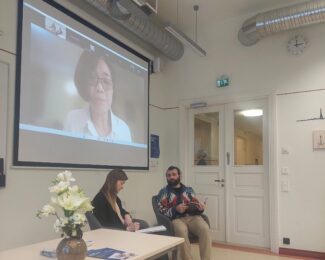 The fifth installment of DeFacto Dialogues titled “Taiwan Amidst Post-Election Turbulence” took place on February 22, 2024, in Tartu and online. The seminar had two esteemed guest speakers, Professor Chueiling Shin from National Sun Yat-sen University (Taiwan) and Ms. Larissa Stünkel, Project Coordinator & Research Associate at Konrad-Adenauer-Stiftung. In the discussion moderated by our own Shpend Kursani, numerous issues regarding the aftermath of the Taiwanese presidential elections both in Taiwan and abroad, and possible developments in cross-strait relations were debated. Our participants focused on the dwindling number of recognitions of Taiwan and its effects, and the Chinese reaction to the results. The diverse audience of the seminar contributed to the discussion by highlighting and asking questions about the current position of the opposition within Taiwan, the identity concerns of both Taiwan and China and the possible implications of the results of the upcoming presidential elections of the United States. The seminar concluded by emphasizing the ambiguous future which awaits Taiwan especially when considering the relations of the US with itself and China.
The fifth installment of DeFacto Dialogues titled “Taiwan Amidst Post-Election Turbulence” took place on February 22, 2024, in Tartu and online. The seminar had two esteemed guest speakers, Professor Chueiling Shin from National Sun Yat-sen University (Taiwan) and Ms. Larissa Stünkel, Project Coordinator & Research Associate at Konrad-Adenauer-Stiftung. In the discussion moderated by our own Shpend Kursani, numerous issues regarding the aftermath of the Taiwanese presidential elections both in Taiwan and abroad, and possible developments in cross-strait relations were debated. Our participants focused on the dwindling number of recognitions of Taiwan and its effects, and the Chinese reaction to the results. The diverse audience of the seminar contributed to the discussion by highlighting and asking questions about the current position of the opposition within Taiwan, the identity concerns of both Taiwan and China and the possible implications of the results of the upcoming presidential elections of the United States. The seminar concluded by emphasizing the ambiguous future which awaits Taiwan especially when considering the relations of the US with itself and China.
 The De Facto States Research Unit is happy to announce that its Fourth Emerging Scholars Workshop on De Facto States will be taking place online on 11-12 April 2024. The event is open to those working on de facto states, state recognition, secession, and related topics from the fields of political science, international relations, history, sociology, and neighbouring disciplines. The workshop will serve as a platform for introducing ongoing research projects, receiving feedback from peers, and establishing a network of emerging scholars working on the above-mentioned topics. We will discuss research projects in various stages in development, such as theses, whether in their initial stage or close to completion, book chapters or articles in progress, etc. Read the full call here.
The De Facto States Research Unit is happy to announce that its Fourth Emerging Scholars Workshop on De Facto States will be taking place online on 11-12 April 2024. The event is open to those working on de facto states, state recognition, secession, and related topics from the fields of political science, international relations, history, sociology, and neighbouring disciplines. The workshop will serve as a platform for introducing ongoing research projects, receiving feedback from peers, and establishing a network of emerging scholars working on the above-mentioned topics. We will discuss research projects in various stages in development, such as theses, whether in their initial stage or close to completion, book chapters or articles in progress, etc. Read the full call here.
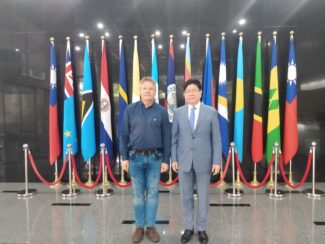 On November 10-21, 2023, Eiki Berg made a research visit to Kaohsiung and Taipei in order to meet distinguished scholars and experts in the field of security studies and U.S. – Taiwan relations: Prof Ming-Yi Lee, Prof. Mitch Chou, Prof Chaokuei Lee, Prof Chueiling Shin, Assist. Prof Weihao Huang, Prof Jing Chang, Prof Weng-Cheng Lin, Prof Min-Hua Huang, Dr Christine Lai, Dr Anne Hsiao, Ambassador Ming-Zhong Zhang, He participated in the Taiwan Political Science Association Annual Conference on The Impact of the International Order and the Challenge of Democratic Politics and National Taiwan University organised symposium on Xi Jinping’s Third Term: Opportunities and Challenges. He also gave a lecture on “Revisiting Geopolitics” to the National Sun-Yatsen University students and met Mr Paulius Lukauskas, the Representative of Lithuanian Trade Office in Taiwan. One of the observations of this visit was that Taiwan might need “strategic clarity” both in terms of its own self-defense and allied relationship with U.S.
On November 10-21, 2023, Eiki Berg made a research visit to Kaohsiung and Taipei in order to meet distinguished scholars and experts in the field of security studies and U.S. – Taiwan relations: Prof Ming-Yi Lee, Prof. Mitch Chou, Prof Chaokuei Lee, Prof Chueiling Shin, Assist. Prof Weihao Huang, Prof Jing Chang, Prof Weng-Cheng Lin, Prof Min-Hua Huang, Dr Christine Lai, Dr Anne Hsiao, Ambassador Ming-Zhong Zhang, He participated in the Taiwan Political Science Association Annual Conference on The Impact of the International Order and the Challenge of Democratic Politics and National Taiwan University organised symposium on Xi Jinping’s Third Term: Opportunities and Challenges. He also gave a lecture on “Revisiting Geopolitics” to the National Sun-Yatsen University students and met Mr Paulius Lukauskas, the Representative of Lithuanian Trade Office in Taiwan. One of the observations of this visit was that Taiwan might need “strategic clarity” both in terms of its own self-defense and allied relationship with U.S.
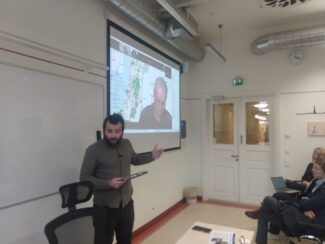 A session of DeFacto Dialogues called “Israel and Hamas on the brink of an all-out war within and beyond Gaza?” took place on the 24th of October. The seminar featured Michelle Pace (Roskilde University) and Oren Yiftachel (Ben-Gurion University of the Negev) who shared their thoughts on the warm-up of the Israel-Palestine conflict. Questions from the moderator sparked discussions of international law, the intervention of other countries in the conflict, and the possibility of peace. It was agreed that this conflict has not been silent all these years but attacks with this severity have not been seen anywhere in the world in a long time. It was also agreed that the USA and the EU play an important role in the conflict and both should heavily condemn war crimes that are being commited, and that countries should take the Palestinians’ right to self-determination more seriously. The session concluded that both sides have suffered historically and this generational hatred is not easy to break. This solidifies the previous arguments about the difficulty of achieving peace, even though it is necessary for both Israelis and Palestinians.
A session of DeFacto Dialogues called “Israel and Hamas on the brink of an all-out war within and beyond Gaza?” took place on the 24th of October. The seminar featured Michelle Pace (Roskilde University) and Oren Yiftachel (Ben-Gurion University of the Negev) who shared their thoughts on the warm-up of the Israel-Palestine conflict. Questions from the moderator sparked discussions of international law, the intervention of other countries in the conflict, and the possibility of peace. It was agreed that this conflict has not been silent all these years but attacks with this severity have not been seen anywhere in the world in a long time. It was also agreed that the USA and the EU play an important role in the conflict and both should heavily condemn war crimes that are being commited, and that countries should take the Palestinians’ right to self-determination more seriously. The session concluded that both sides have suffered historically and this generational hatred is not easy to break. This solidifies the previous arguments about the difficulty of achieving peace, even though it is necessary for both Israelis and Palestinians.
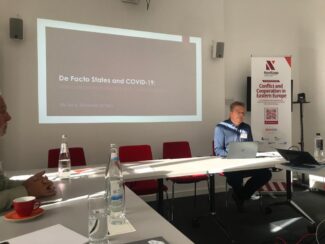 Eiki Berg participated in a workshop titled “The Political Economy of Unrecognized Statehood,” organized by ZOIS (Centre For East European and International Studies). The event took place in the historic city of Berlin on October 16-18, and focused on methodological aspects of researching de facto state economies, integration/dis-integration of de facto states in the world market and the relationship between economic practices and/or relations of de facto states and conflict dynamics. Eiki Berg presented a paper titled “De Facto States and COVID-19: New Comparative Insights into Capacity to Act” which is co-authored by himself, Scott Pegg (Indiana University Purdue University) and Raul Toomla (University of Tartu). The paper studies the agency of de facto states by utilizing the shock COVID-19 inflicted upon the economies of these entities. By making use of a previous work by Berg&Toomla (2009) on de facto states’ integration into international capacity, they argue that the pandemic provides a great opportunity to analyze the economic capabilities of de facto states. Their respective responses to the pandemic allows the authors to measure the agencies of the de facto states subject to research (Taiwan, Northern Cyprus, Kosovo, Transnistria, Abkhazia, Somaliland and Nagorno-Karabakh).
Eiki Berg participated in a workshop titled “The Political Economy of Unrecognized Statehood,” organized by ZOIS (Centre For East European and International Studies). The event took place in the historic city of Berlin on October 16-18, and focused on methodological aspects of researching de facto state economies, integration/dis-integration of de facto states in the world market and the relationship between economic practices and/or relations of de facto states and conflict dynamics. Eiki Berg presented a paper titled “De Facto States and COVID-19: New Comparative Insights into Capacity to Act” which is co-authored by himself, Scott Pegg (Indiana University Purdue University) and Raul Toomla (University of Tartu). The paper studies the agency of de facto states by utilizing the shock COVID-19 inflicted upon the economies of these entities. By making use of a previous work by Berg&Toomla (2009) on de facto states’ integration into international capacity, they argue that the pandemic provides a great opportunity to analyze the economic capabilities of de facto states. Their respective responses to the pandemic allows the authors to measure the agencies of the de facto states subject to research (Taiwan, Northern Cyprus, Kosovo, Transnistria, Abkhazia, Somaliland and Nagorno-Karabakh).
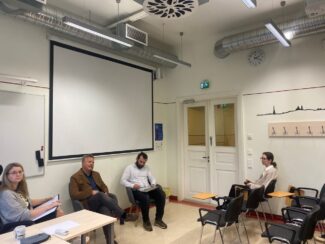 The latest session of DeFacto Dialogues titled “Shifting Borders vs. Moving People: (Non-)solutions to Territorial Disputes,” organized by the De Facto States Research Unit took place on October 5, 2023. Our own Eiki Berg and Shpend Kursani shared their observations with a full classroom of audience, guided by the impeccable moderation of Kristel Vits. The conversation first took the listeners to the details and relevance of Eiki and Shpend’s book, De facto states and land-for-peace agreements: territory and recognition at odds? in light of the recent events in Nagorno-Karabakh. The use of land by de facto states as an object of exchange for recognition, empirical evidence for spillover effects of changing borders and incompatibility issues between the perception of the Self by secessionists in an existing parent state structure were discussed. As the conversation evolved, the recent developments in Nagorno-Karabakh and Kosovo took the stage. Changes in contexts of both entities over time and moments of opportunity and tensions were highlighted. The thought-provoking discussion ended with an emphasis on the persisting ambivalence of the precarious existence of de facto states, with Nagorno-Karabakh set to disappear from the international scene on January 1, 2024.
The latest session of DeFacto Dialogues titled “Shifting Borders vs. Moving People: (Non-)solutions to Territorial Disputes,” organized by the De Facto States Research Unit took place on October 5, 2023. Our own Eiki Berg and Shpend Kursani shared their observations with a full classroom of audience, guided by the impeccable moderation of Kristel Vits. The conversation first took the listeners to the details and relevance of Eiki and Shpend’s book, De facto states and land-for-peace agreements: territory and recognition at odds? in light of the recent events in Nagorno-Karabakh. The use of land by de facto states as an object of exchange for recognition, empirical evidence for spillover effects of changing borders and incompatibility issues between the perception of the Self by secessionists in an existing parent state structure were discussed. As the conversation evolved, the recent developments in Nagorno-Karabakh and Kosovo took the stage. Changes in contexts of both entities over time and moments of opportunity and tensions were highlighted. The thought-provoking discussion ended with an emphasis on the persisting ambivalence of the precarious existence of de facto states, with Nagorno-Karabakh set to disappear from the international scene on January 1, 2024.
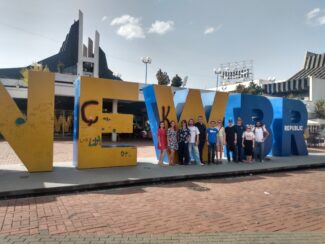 On 23-30 September, 2023, a group of students from the International Relations and Regional Studies programme took a research trip to Kosovo under the supervision of the DFSRU. The aim of the trip was to learn about the ongoing process of normalisation between Serbia and Kosovo. The students met scholars and practitioners including Robert Muharremi, Edita Tahiri, Bernard Nikaj, Aleksandra Jovanovic, Adlen Siljak, Liza Gashi, Ardian Arifaj, Leandrit Mehmeti, Michael Davenport and Leutrim Ajeti. The visit provided students with eye-opening, rich, and new hands-on experiences. Furthermore it coincided with clashes which took place near Zvečan on Sunday, 24th of September, and which claimed the lives of a Kosovo policeman and three Serb paramilitaries. The visit to the conflict zone concluded with a rather pessimistic note from Cian Deasy: „Despite years of talks, it seems that the situation on the ground in Kosovo remains a deeply challenging one. What was most concerning was that things now seem to be getting worse, not better.“
On 23-30 September, 2023, a group of students from the International Relations and Regional Studies programme took a research trip to Kosovo under the supervision of the DFSRU. The aim of the trip was to learn about the ongoing process of normalisation between Serbia and Kosovo. The students met scholars and practitioners including Robert Muharremi, Edita Tahiri, Bernard Nikaj, Aleksandra Jovanovic, Adlen Siljak, Liza Gashi, Ardian Arifaj, Leandrit Mehmeti, Michael Davenport and Leutrim Ajeti. The visit provided students with eye-opening, rich, and new hands-on experiences. Furthermore it coincided with clashes which took place near Zvečan on Sunday, 24th of September, and which claimed the lives of a Kosovo policeman and three Serb paramilitaries. The visit to the conflict zone concluded with a rather pessimistic note from Cian Deasy: „Despite years of talks, it seems that the situation on the ground in Kosovo remains a deeply challenging one. What was most concerning was that things now seem to be getting worse, not better.“
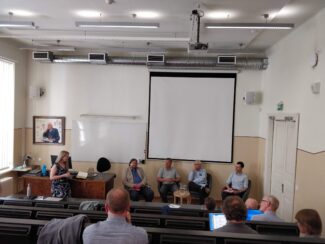 The De Facto States Research Unit organised a pre-conference workshop on June 11, 2023 where issues such as “Using large-N data sets for de facto state research: What, why, how and for whom?”, and “How to study and teach de facto states in times of crises?“ were discussed. Discussions revolved around the questions whether de facto states research contributes to legitimation and creeping recognition of these entities, and to what extent a “view from outside“ and claimed “neutrality“ are possible at all at times of crises. Among the invitees to share their views we had Tomaš Hoch, Nicholas Barker, Tatiana Cojocari, Keith Harrington, Marcin Kosienkowski, Martin Riegl, Bruno Coppieters, Friederike Augustine, Pal Kolstoe, Vera Axyonova, Vincenc Kopecek, Helge Blakkisrud, Gerard Toal, Stephen Hall, Benedicte Santoire, Tony van der Togt, Andrea Florea and Bohumil Doboš. The workshop was supported by the Estonian Research Council Grant PRG1798.
The De Facto States Research Unit organised a pre-conference workshop on June 11, 2023 where issues such as “Using large-N data sets for de facto state research: What, why, how and for whom?”, and “How to study and teach de facto states in times of crises?“ were discussed. Discussions revolved around the questions whether de facto states research contributes to legitimation and creeping recognition of these entities, and to what extent a “view from outside“ and claimed “neutrality“ are possible at all at times of crises. Among the invitees to share their views we had Tomaš Hoch, Nicholas Barker, Tatiana Cojocari, Keith Harrington, Marcin Kosienkowski, Martin Riegl, Bruno Coppieters, Friederike Augustine, Pal Kolstoe, Vera Axyonova, Vincenc Kopecek, Helge Blakkisrud, Gerard Toal, Stephen Hall, Benedicte Santoire, Tony van der Togt, Andrea Florea and Bohumil Doboš. The workshop was supported by the Estonian Research Council Grant PRG1798.
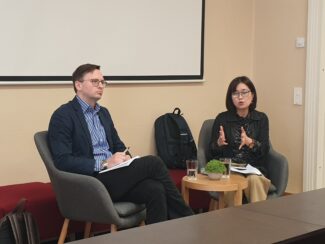 On April 27, 2023, Johan Skytte Institute of Political Studies hosted the second DeFacto Dialogues session on „Taiwan Caught in the Middle of Great Power Rivalry in Asia Pacific“. The event was organized by our research unit with the participation of Frank Jüris (International Centre for Defence and Security, Estonia) and Chueiling Shin (National Sun Yat-sen University, Taiwan) as the discussants and Eiki Berg as the moderator. During this discussion, the issues of Taiwan’s geostrategic positioning, China’s reintegration endeavours ranging from direct war threats to incentivizing actions as well as U.S. countermeasures within the context of Taiwan Relations Act, were elaborated further. This event took place under our ETAG funded project, “Exploring Dynamics of ‘Frozen Conflicts’ through Actor-based Interactions” (PRG1798).
On April 27, 2023, Johan Skytte Institute of Political Studies hosted the second DeFacto Dialogues session on „Taiwan Caught in the Middle of Great Power Rivalry in Asia Pacific“. The event was organized by our research unit with the participation of Frank Jüris (International Centre for Defence and Security, Estonia) and Chueiling Shin (National Sun Yat-sen University, Taiwan) as the discussants and Eiki Berg as the moderator. During this discussion, the issues of Taiwan’s geostrategic positioning, China’s reintegration endeavours ranging from direct war threats to incentivizing actions as well as U.S. countermeasures within the context of Taiwan Relations Act, were elaborated further. This event took place under our ETAG funded project, “Exploring Dynamics of ‘Frozen Conflicts’ through Actor-based Interactions” (PRG1798).
The De Facto States Research Unit i s happy to announce that its Third Emerging Scholars Workshop on De Facto States will be taking place online on 13-14 April 2023. The event is open to those working on de facto states, state recognition, secession, and related topics from the fields of political science, international relations, history, sociology, and neighbouring disciplines. The workshop will serve as a platform for introducing ongoing research projects, receiving feedback from peers, and establishing a network of emerging scholars working on the above-mentioned topics. We will discuss research projects in various stages in development, such as theses, whether in their initial stage or close to completion, book chapters or articles in progress, etc. Read the full programme here.
s happy to announce that its Third Emerging Scholars Workshop on De Facto States will be taking place online on 13-14 April 2023. The event is open to those working on de facto states, state recognition, secession, and related topics from the fields of political science, international relations, history, sociology, and neighbouring disciplines. The workshop will serve as a platform for introducing ongoing research projects, receiving feedback from peers, and establishing a network of emerging scholars working on the above-mentioned topics. We will discuss research projects in various stages in development, such as theses, whether in their initial stage or close to completion, book chapters or articles in progress, etc. Read the full programme here.
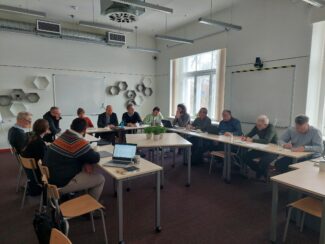 On March 18, 2023, the kick-off meeting for our ETAG funded project “Exploring Dynamics of ‘Frozen Conflicts’ through Actor-based Interactions” (PRG1798) took place. During the busy but enlightening day, our research unit enjoyed the privilege of benefitting from the knowledge and experiences of Thomas de Waal, Giorgio Comai, Rafael Biermann, Helge Blakkisrud, Vera Axyonova, Stefan Wolff, David Newman, Yücel Vural and James Ker-Lindsey. Vital theoretical, terminological and research issues related to our project were thoroughly unfolded. In five sessions altogether, we discussed different dynamics affecting de facto states stuck in ‘frozen conflicts’, such as patron-client relations, counter-secessionism, left-behind minorities, engagement without recognition and great power games (led by Rafael Biermann, James Ker-Lindsey, Stefan Wolff, Thomas de Waal and David Newman, respectively). We thank our colleagues for their priceless contributions.
On March 18, 2023, the kick-off meeting for our ETAG funded project “Exploring Dynamics of ‘Frozen Conflicts’ through Actor-based Interactions” (PRG1798) took place. During the busy but enlightening day, our research unit enjoyed the privilege of benefitting from the knowledge and experiences of Thomas de Waal, Giorgio Comai, Rafael Biermann, Helge Blakkisrud, Vera Axyonova, Stefan Wolff, David Newman, Yücel Vural and James Ker-Lindsey. Vital theoretical, terminological and research issues related to our project were thoroughly unfolded. In five sessions altogether, we discussed different dynamics affecting de facto states stuck in ‘frozen conflicts’, such as patron-client relations, counter-secessionism, left-behind minorities, engagement without recognition and great power games (led by Rafael Biermann, James Ker-Lindsey, Stefan Wolff, Thomas de Waal and David Newman, respectively). We thank our colleagues for their priceless contributions.
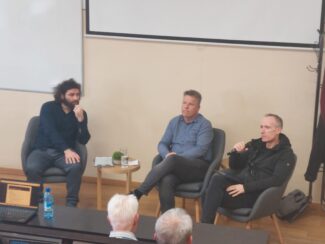 On March 17, 2023, Johan Skytte Institute of Political Studies hosted the first DeFacto Dialogues session on “De Facto States After Russia’s Invasion of Ukraine.” The event was organized by our research unit with the participation of Eiki Berg and Stefan Wolff (University of Birmingham) as the discussants and Shpend Kursani as the moderator. During the first talk of our series, broader information on de facto states, reorientation of Russian policies on de facto states, loss of Russian influence in the post-Soviet regions and Western Balkans, the increasing role of China and the future of de facto states were extensively discussed, ending with curiosity-inducing questions from the audience. This event took place under our ETAG funded project, “Exploring Dynamics of ‘Frozen Conflicts’ through Actor-based Interactions” (PRG1798).
On March 17, 2023, Johan Skytte Institute of Political Studies hosted the first DeFacto Dialogues session on “De Facto States After Russia’s Invasion of Ukraine.” The event was organized by our research unit with the participation of Eiki Berg and Stefan Wolff (University of Birmingham) as the discussants and Shpend Kursani as the moderator. During the first talk of our series, broader information on de facto states, reorientation of Russian policies on de facto states, loss of Russian influence in the post-Soviet regions and Western Balkans, the increasing role of China and the future of de facto states were extensively discussed, ending with curiosity-inducing questions from the audience. This event took place under our ETAG funded project, “Exploring Dynamics of ‘Frozen Conflicts’ through Actor-based Interactions” (PRG1798).
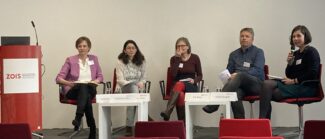 On March 3, 2023, Eiki Berg participated in roundtable on „Acquiring and Interpreting Contested Data – Research on and in De Facto States“ with Gaëlle Le Pavic (University of Ghent), Sabine von Löwis (ZOiS), Gwendolyn Sasse (ZOiS) and Nadja Douglas (ZOiS). The event took place under KonKoop project (Conflict and Cooperation in Eastern Europe. The consequences of the reconfiguration of political, economic and social spaces since the end of the Cold War).
On March 3, 2023, Eiki Berg participated in roundtable on „Acquiring and Interpreting Contested Data – Research on and in De Facto States“ with Gaëlle Le Pavic (University of Ghent), Sabine von Löwis (ZOiS), Gwendolyn Sasse (ZOiS) and Nadja Douglas (ZOiS). The event took place under KonKoop project (Conflict and Cooperation in Eastern Europe. The consequences of the reconfiguration of political, economic and social spaces since the end of the Cold War).
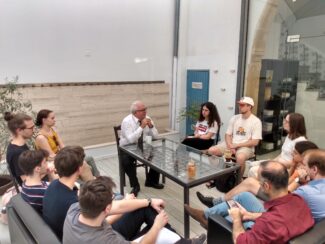 From 28 October to 6 November, 2022, a group of International Relations and Regional Studies programme students took a research trip to Cyprus under the supervision of the DFSRU. The aim of the trip was to gain fresh insights from this protracted conflict. The students met scholars and practitioners from both sides of the division: Yiannis Papadakis, Costas Constantinou, Nayia Kamenou, Nasia Hadjigeorgiou, Mete Hatay, Zehra Azizbeyli, Nur Köprülü, İbrahim Ayberk, Sait Akşit, Mustafa Çıraklı, Emine Sülün, Ahmet Sozen, Kemal Baykalli, Ergün Olgun and Ersin Tatar. The visit provided students with eye-opening, rich, and new hands-on experiences. Nevertheless, it concluded with a rather pessimistic note from Adam Ziogas: „There is no discussion, no creative ideas, no bravery to put forward a solution. It is purely a game of survival, where each regime ensures its longevity by maintaining the conflict and thus stabilising their status vis-à-vis their Other, eternally stabilising instability.“
From 28 October to 6 November, 2022, a group of International Relations and Regional Studies programme students took a research trip to Cyprus under the supervision of the DFSRU. The aim of the trip was to gain fresh insights from this protracted conflict. The students met scholars and practitioners from both sides of the division: Yiannis Papadakis, Costas Constantinou, Nayia Kamenou, Nasia Hadjigeorgiou, Mete Hatay, Zehra Azizbeyli, Nur Köprülü, İbrahim Ayberk, Sait Akşit, Mustafa Çıraklı, Emine Sülün, Ahmet Sozen, Kemal Baykalli, Ergün Olgun and Ersin Tatar. The visit provided students with eye-opening, rich, and new hands-on experiences. Nevertheless, it concluded with a rather pessimistic note from Adam Ziogas: „There is no discussion, no creative ideas, no bravery to put forward a solution. It is purely a game of survival, where each regime ensures its longevity by maintaining the conflict and thus stabilising their status vis-à-vis their Other, eternally stabilising instability.“
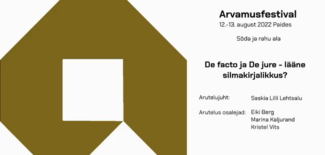 13. augustil 2022 arutlesid Paide Arvamusfestivalil Eiki Berg, Marina Kaljurand ja Kristel Vits selle üle, kellel on õigus enesemääramiseks; kas lääs võib oma huvides teha sama, mida Venemaa tegi Ukrainaga; kas Narva on järgmine Donetsk või Luhansk; mida tähendab rahvus globaalses piiridega maailmas; kelle jaoks on kasulik piire hoida ja kelle jaoks me oleme nõus neid muutma. Arutelu juhtis Saskia Lilli Lehtsalu.
13. augustil 2022 arutlesid Paide Arvamusfestivalil Eiki Berg, Marina Kaljurand ja Kristel Vits selle üle, kellel on õigus enesemääramiseks; kas lääs võib oma huvides teha sama, mida Venemaa tegi Ukrainaga; kas Narva on järgmine Donetsk või Luhansk; mida tähendab rahvus globaalses piiridega maailmas; kelle jaoks on kasulik piire hoida ja kelle jaoks me oleme nõus neid muutma. Arutelu juhtis Saskia Lilli Lehtsalu.
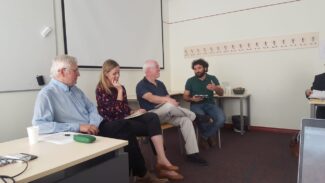 On 11 June 2022, DFSRU hosted a great bunch of scholars dealing with de facto states for a one-day workshop. The topics that were discussed included „What’s in a name? Can we move further from the debate about definitions?“; „What is there we don’t know yet but need to explore further?“; „Expanding the fields of de facto states research. How can we better learn from each other?“ Among the 20+ participants there were Scott Pegg, Nina Caspersen, Pal Kolstoe, Helge Blakkisrud, Rebecca Bryant, Magdalena Dembinska and others.
On 11 June 2022, DFSRU hosted a great bunch of scholars dealing with de facto states for a one-day workshop. The topics that were discussed included „What’s in a name? Can we move further from the debate about definitions?“; „What is there we don’t know yet but need to explore further?“; „Expanding the fields of de facto states research. How can we better learn from each other?“ Among the 20+ participants there were Scott Pegg, Nina Caspersen, Pal Kolstoe, Helge Blakkisrud, Rebecca Bryant, Magdalena Dembinska and others.
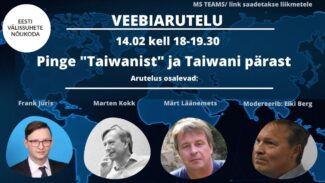 14. veebruaril 2022 toimus Eesti Välissuhete Nõukoja veebiarutelu teemal „Pinge ’Taiwanist’ ja Taiwani pärast“. Osalesid Frank Jüris, Eesti Välispoliitika Instituudi teadur ja Aasia ekspert; Märt Läänemets, vabakutseline orientalist ja sinoloog; Marten Kokk, endine Eesti Vabariigi suursaadik Hiina RV juures. Modereeris Eiki Berg, TÜ rahvusvaheliste suhete professor. Arutelu keskendus viimasel ajal kuhjunud pingetele üleväina suhetes (cross-strait relations), s.o siis Taiwani ootustest leida samameelseid liitlasi ja rahvusvahelist tunnustust ning Hiina RV katsetest tasalülitada taiwanlaste sellist iseolemist, mis läheb vastuollu „ühe Hiina printsiibiga“. Taustaks USA kui Taiwani patroonriigi suhete teravnemine Hiina RV-ga.
14. veebruaril 2022 toimus Eesti Välissuhete Nõukoja veebiarutelu teemal „Pinge ’Taiwanist’ ja Taiwani pärast“. Osalesid Frank Jüris, Eesti Välispoliitika Instituudi teadur ja Aasia ekspert; Märt Läänemets, vabakutseline orientalist ja sinoloog; Marten Kokk, endine Eesti Vabariigi suursaadik Hiina RV juures. Modereeris Eiki Berg, TÜ rahvusvaheliste suhete professor. Arutelu keskendus viimasel ajal kuhjunud pingetele üleväina suhetes (cross-strait relations), s.o siis Taiwani ootustest leida samameelseid liitlasi ja rahvusvahelist tunnustust ning Hiina RV katsetest tasalülitada taiwanlaste sellist iseolemist, mis läheb vastuollu „ühe Hiina printsiibiga“. Taustaks USA kui Taiwani patroonriigi suhete teravnemine Hiina RV-ga.
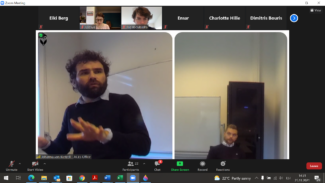 On Nov 25, 2021, Shpend Kursani presented a brief overview about the forthcoming book (co-authored with Eiki Berg) „De Facto States and Land for Peace Agreements: Territory and Recognition at Odds“ at the University of Amsterdam, under the 6th Practitioners Engagement Series in Cooperation with the EUMENIA network. The event was organised by Dimitris Bouris (University of Amsterdam) and involved the invited discussant Olesya Vartanyan (International Crises Group).
On Nov 25, 2021, Shpend Kursani presented a brief overview about the forthcoming book (co-authored with Eiki Berg) „De Facto States and Land for Peace Agreements: Territory and Recognition at Odds“ at the University of Amsterdam, under the 6th Practitioners Engagement Series in Cooperation with the EUMENIA network. The event was organised by Dimitris Bouris (University of Amsterdam) and involved the invited discussant Olesya Vartanyan (International Crises Group).
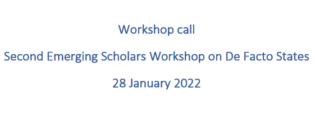 The De Facto States Research Unit is happy to announce that its Second Emerging Scholars Workshop on De Facto States will be taking place on January 28, 2022. The call is open to postgraduate students and early career scholars working on de facto states, state recognition, secession, and similar topics in the fields of political science, international relations, history, economics, and other related disciplines. The workshop will serve as a platform for introducing ongoing research projects, receiving feedback from peers, and establishing a network of emerging scholars working on the above-mentioned topics.
The De Facto States Research Unit is happy to announce that its Second Emerging Scholars Workshop on De Facto States will be taking place on January 28, 2022. The call is open to postgraduate students and early career scholars working on de facto states, state recognition, secession, and similar topics in the fields of political science, international relations, history, economics, and other related disciplines. The workshop will serve as a platform for introducing ongoing research projects, receiving feedback from peers, and establishing a network of emerging scholars working on the above-mentioned topics.
We welcome projects in various stages in development, such as theses, whether in their initial stage or close to completion, book chapters or articles in progress, etc. Each participant should prepare a 15-minute presentation. Please fill in this Google Form by December 20, if you would like to present at the workshop, or by January 27, if you wish to attend as a listener. Read the full call here.
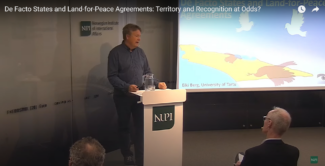 On Oct 5, 2021, Eiki Berg presented a brief overview about the forthcoming book (co-authored with Shpend Kursani) „De Facto States and Land for Peace Agreements: Territory and Recognition at Odds“ at NUPI (Norsk utenrikspolitisk institutt). His talk revolved around the issues whether there can be geographical solutions to secessionist conflicts that are caught between two principles at cross purposes: the principle of self-determination (defended by de facto states) and the principle of territorial integrity (defened by parent states). The seminar explored further the possibility of land-for-peace agreements in four de facto state–parent state pairs: Kosovo–Serbia, Nagorno-Karabakh–Azerbaijan, Northern Cyprus–Republic of Cyprus, Abkhazia–Georgia.
On Oct 5, 2021, Eiki Berg presented a brief overview about the forthcoming book (co-authored with Shpend Kursani) „De Facto States and Land for Peace Agreements: Territory and Recognition at Odds“ at NUPI (Norsk utenrikspolitisk institutt). His talk revolved around the issues whether there can be geographical solutions to secessionist conflicts that are caught between two principles at cross purposes: the principle of self-determination (defended by de facto states) and the principle of territorial integrity (defened by parent states). The seminar explored further the possibility of land-for-peace agreements in four de facto state–parent state pairs: Kosovo–Serbia, Nagorno-Karabakh–Azerbaijan, Northern Cyprus–Republic of Cyprus, Abkhazia–Georgia.
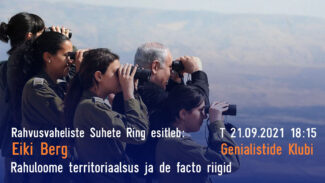 Kuidas vasttekkinud riigid kindlustavad oma territoriaalsust? Kuidas maa jagamine/jaotamine/ümbermängimine tänapäeva rahutegemisel välja näeb? Millised on olemasolevad (hiljutised) näited ning kuidas võib nendele analüütiliselt läheneda? Kas selliste näidete puhul on olulisemad territooriumite materiaalsed või mittemateriaalsed väärtused? Sellest räägib Rahvusvaheliste Suhete Ringis Tartu Ülikooli rahvusvaheliste suhete professor Eiki Berg.
Kuidas vasttekkinud riigid kindlustavad oma territoriaalsust? Kuidas maa jagamine/jaotamine/ümbermängimine tänapäeva rahutegemisel välja näeb? Millised on olemasolevad (hiljutised) näited ning kuidas võib nendele analüütiliselt läheneda? Kas selliste näidete puhul on olulisemad territooriumite materiaalsed või mittemateriaalsed väärtused? Sellest räägib Rahvusvaheliste Suhete Ringis Tartu Ülikooli rahvusvaheliste suhete professor Eiki Berg.
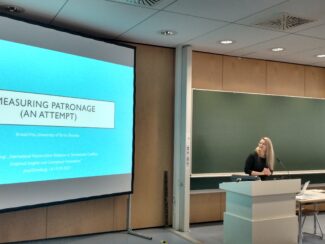 On September 19, 2021, Kristel Vits presented a paper on „Measuring Patronage“ at the workshop International Patron Client Relations in Secessionist Conflicts: Empirical Insights and Conceptual Innovations, organised by Friedrich-Schiller-Universität Jena. Her research attempts to measure de facto state dependence on patron states/parent states in four different dimensions: economic, political-military, socio-cultural and connectivity.
On September 19, 2021, Kristel Vits presented a paper on „Measuring Patronage“ at the workshop International Patron Client Relations in Secessionist Conflicts: Empirical Insights and Conceptual Innovations, organised by Friedrich-Schiller-Universität Jena. Her research attempts to measure de facto state dependence on patron states/parent states in four different dimensions: economic, political-military, socio-cultural and connectivity.
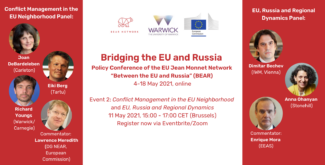 On May 11, 2021, Eiki Berg presented a policy memo „Can European Brakes Slow Down Russia’s Drive in Secessionist Conflicts?“ at the policy conference of the EU Jean Monnet Network Between the EU and Russia (BEAR). His policy advice suggested an informal and unsystematic motion on ad hoc basis towards de facto states combined with unified approach everywhere where human rights are at stake due to these unresolved conflicts.
On May 11, 2021, Eiki Berg presented a policy memo „Can European Brakes Slow Down Russia’s Drive in Secessionist Conflicts?“ at the policy conference of the EU Jean Monnet Network Between the EU and Russia (BEAR). His policy advice suggested an informal and unsystematic motion on ad hoc basis towards de facto states combined with unified approach everywhere where human rights are at stake due to these unresolved conflicts.
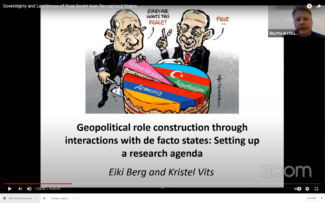 On April 12, 2021, Eiki Berg and Kristel Vits presented some sketchy ideas of how to study geopolitical role formation of de facto states at the workshop on Sovereignty and Legitimacy of Post-Soviet Non-Recognized States. In their view, all de facto states find themselves in the middle of geopolitical competition. This may pose a risk for their survival as geopolitical competition may always be transformed into active warfare with unpredictable results. But this may be also seen as a guarantee for de facto state survival, thus being in the interest of patron states to actively engage on the side of secessionists. For de facto states in between, such rivalry creates opportunities to (re-)negotiate their geopolitical roles with the reference to what they would like to be and how they should interact in relationships in order to gain the expected role.
On April 12, 2021, Eiki Berg and Kristel Vits presented some sketchy ideas of how to study geopolitical role formation of de facto states at the workshop on Sovereignty and Legitimacy of Post-Soviet Non-Recognized States. In their view, all de facto states find themselves in the middle of geopolitical competition. This may pose a risk for their survival as geopolitical competition may always be transformed into active warfare with unpredictable results. But this may be also seen as a guarantee for de facto state survival, thus being in the interest of patron states to actively engage on the side of secessionists. For de facto states in between, such rivalry creates opportunities to (re-)negotiate their geopolitical roles with the reference to what they would like to be and how they should interact in relationships in order to gain the expected role.
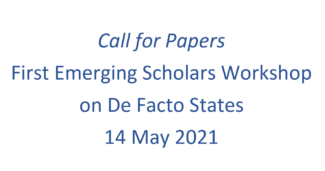 The De Facto States Research Unit cordially invites applications from postgraduate students and early career scholars for its First Emerging Scholars Workshop on De Facto States, taking place on May 14 2021. The call is open to those working on de facto states, state recognition, secession, and similar topics from the fields of political science, international relations, history, economics, and other related disciplines. The workshop will serve as a platform for introducing ongoing research projects, receiving feedback from peers, and establishing a strong global network of emerging scholars researching the above-mentioned topics.
The De Facto States Research Unit cordially invites applications from postgraduate students and early career scholars for its First Emerging Scholars Workshop on De Facto States, taking place on May 14 2021. The call is open to those working on de facto states, state recognition, secession, and similar topics from the fields of political science, international relations, history, economics, and other related disciplines. The workshop will serve as a platform for introducing ongoing research projects, receiving feedback from peers, and establishing a strong global network of emerging scholars researching the above-mentioned topics.
Interested applicants should fill out the Google Form by 30 April. We welcome projects in various stages of development, such as theses, whether in their initial stage or close to completion, book chapters or articles in progress etc. Each participant should prepare a 15-minute presentation. If you wish to attend without a presentation, please fill in this Google Form to receive the workshop details before the event. Read the call here.
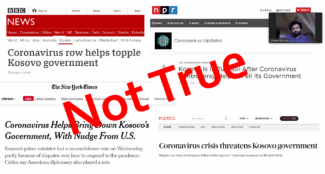 On February 14, 2021, Kosovars elected their new parliament. The leader of the Self-Determination Movement, Albin Kurti, claimed victory after his party received just over 48% of the vote and therefore possibly 57 seats in the Kosovar parliament (out of 120). With the dissolution of political debate along the right-left axis in Kosovo, the clashing “ideologies” presented in this election were those between “the new” and “the old” during the campaign period. Many believed that “the new” would trump “the old”, but this expectation was unlikely to be realized – if the players were the same old, how could it be different? Our team member, Shpend Kursani, held a webinar entitled Kosovo Parliamentary elections: The old, the new, and the new old? where he explored the possible implications that these election results might have on the power dynamics within the country, between Kosovo and Serbia and the other power players.
On February 14, 2021, Kosovars elected their new parliament. The leader of the Self-Determination Movement, Albin Kurti, claimed victory after his party received just over 48% of the vote and therefore possibly 57 seats in the Kosovar parliament (out of 120). With the dissolution of political debate along the right-left axis in Kosovo, the clashing “ideologies” presented in this election were those between “the new” and “the old” during the campaign period. Many believed that “the new” would trump “the old”, but this expectation was unlikely to be realized – if the players were the same old, how could it be different? Our team member, Shpend Kursani, held a webinar entitled Kosovo Parliamentary elections: The old, the new, and the new old? where he explored the possible implications that these election results might have on the power dynamics within the country, between Kosovo and Serbia and the other power players.
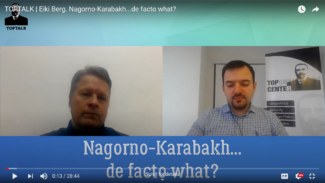 On December 11, 2020, Professor Eiki Berg was interviewed by Rusif Huseynov from the Topchubashov Center. This TOPTALK addressed questions that led Armenia and Azerbaijan into war again in September 27, 2020, which created a new status quo by November 10, 2020. More specifically, this talk focuses on different interpretations of the war as well as explores Russia’s intermediary role in ending recent hostilities. Finally, it examines the status question of NKR being under Russian protection and at the same time still seeking international recognition.
On December 11, 2020, Professor Eiki Berg was interviewed by Rusif Huseynov from the Topchubashov Center. This TOPTALK addressed questions that led Armenia and Azerbaijan into war again in September 27, 2020, which created a new status quo by November 10, 2020. More specifically, this talk focuses on different interpretations of the war as well as explores Russia’s intermediary role in ending recent hostilities. Finally, it examines the status question of NKR being under Russian protection and at the same time still seeking international recognition.
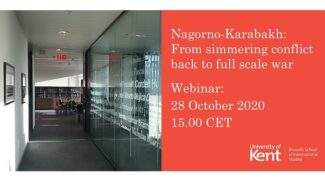 On October 28, 2020, a webinar on “Nagorno-Karabakh: From Simmering Conflict Back to Full Scale War” was co-organised by the Global Europe Centre (GEC) and the Brussels School of International Studies (BSIS) of the University of Kent. Neil Melvin (Royal United Services Institute, London), Eiki Berg (University of Tartu) and Kristin Bakke (University College London) offered their views on the conflict between Armenia and Azerbaijan over the disputed territory of Nagorno-Karabakh.
On October 28, 2020, a webinar on “Nagorno-Karabakh: From Simmering Conflict Back to Full Scale War” was co-organised by the Global Europe Centre (GEC) and the Brussels School of International Studies (BSIS) of the University of Kent. Neil Melvin (Royal United Services Institute, London), Eiki Berg (University of Tartu) and Kristin Bakke (University College London) offered their views on the conflict between Armenia and Azerbaijan over the disputed territory of Nagorno-Karabakh.
While the participants acknowledged that a renewed escalation was widely expected, there were still questions that required more scrutiny. For instance, why did violence flare up now and at this scale? What are the objectives of the conflicting parties? How does it affect the security agenda in the Caucasus? Is there a risk that great powers – Russia, Turkey and Iran – are pulled into the conflict? And are there any hopes for dialogue? The webinar concluded with a pessimistic note that the return to negotiations will be delayed until the conflict parties have a ground to declare the victory whatever this might be.
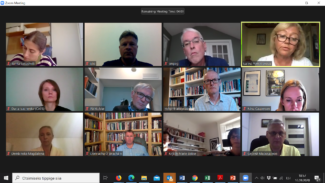 On September 16, 2020, an online kick-off meeting for the project “Dynamics of De Facto State Patron-Client Relations (DeFacto)” took place via Zoom channel.
On September 16, 2020, an online kick-off meeting for the project “Dynamics of De Facto State Patron-Client Relations (DeFacto)” took place via Zoom channel.
’DeFacto’ will shift the research focus from (the lack of) conflict resolution to the factors that perpetuate the status quo, developing a new model for understanding patron-client relations. In particular, it is going to explore the role of domestic constituencies in serving as both as a constraint and a resource that leaders of de facto states can mobilise in negotiations with the patron.
This project is funded by the Research Council of Norway and will be carried out in cooperation with Pål Kolstø, Helge Blakkisrud, Kristin Bakke, Nina Caspersen, Eiki Berg, Magdalena Dembinska, Daria Isachenko, Sergei Markedonov, Donnacha Ó Beacháin, John O’Loughlin, Scott Pegg, Gerard Toal, Galina Yemelianova and Tamta Gelashvili.
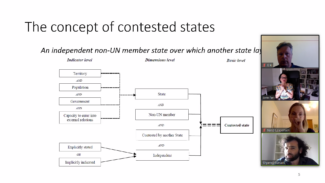 On July 23, 2020, Shpend Kursani defended successfully his doctoral thesis on Contested States: The Struggle for Survival and Recognition in the Post-1945 International Order at the European University Institute, Florence (supervisor Prof Jennifer Walsh, examiners Prof Nina Caspersen, Prof Eiki Berg, Prof Dorothee Bohle). The thesis questions why is it that some contested states survive and others do not? By employing a formal qualitative analysis of all the 30 cases of contested states that emerged after 1945, the thesis finds three pathways to contested state survival. From the theoretical standpoint, the chapters in this thesis shed new light on what our expectations about the contested state’s behavior and interaction with its external environment can be; the heterogeneity of contexts which these entities navigate alongside other actors in the international system; and how the existing international normative environment shapes their domestic realms. When the thesis shows that the persistence of contested states cannot be understood without the enabling factor that the existing society of states plays in maintaining many of these entities as “sovereign anomalies,” it calls attention to the following observation. The international society or its members, at times, do “bend” their widely held rules and principles, which one may view as the international society’s “hypocrisy”. However, it does so for the very maintenance of the overall sense of stability which these rules and principles, seemingly, aim to maintain. In addition to a rich empirical discussion, the thesis also introduces a new time-series dataset of 30 contested states – including the historical ones.
On July 23, 2020, Shpend Kursani defended successfully his doctoral thesis on Contested States: The Struggle for Survival and Recognition in the Post-1945 International Order at the European University Institute, Florence (supervisor Prof Jennifer Walsh, examiners Prof Nina Caspersen, Prof Eiki Berg, Prof Dorothee Bohle). The thesis questions why is it that some contested states survive and others do not? By employing a formal qualitative analysis of all the 30 cases of contested states that emerged after 1945, the thesis finds three pathways to contested state survival. From the theoretical standpoint, the chapters in this thesis shed new light on what our expectations about the contested state’s behavior and interaction with its external environment can be; the heterogeneity of contexts which these entities navigate alongside other actors in the international system; and how the existing international normative environment shapes their domestic realms. When the thesis shows that the persistence of contested states cannot be understood without the enabling factor that the existing society of states plays in maintaining many of these entities as “sovereign anomalies,” it calls attention to the following observation. The international society or its members, at times, do “bend” their widely held rules and principles, which one may view as the international society’s “hypocrisy”. However, it does so for the very maintenance of the overall sense of stability which these rules and principles, seemingly, aim to maintain. In addition to a rich empirical discussion, the thesis also introduces a new time-series dataset of 30 contested states – including the historical ones.
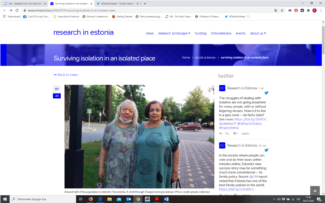 Research in Estonia is an online portal that introduces Estonian research on an international level and for international audience. The main target groups are researchers coming from abroad, international journalists, R&D administrators and delegates. Marian Männi, an Estonian journalist, writes in her most recent posting from July 1, 2020, about “Surviving isolation in an isolated place”. Her article points to the places that legally speaking “do not exist”. She demonstrates the need for more extensive research on de facto states which still matter a lot in international politics. Much has been done in this research field also by De Facto States Research Unit in Estonia, yet there are still more to explore.
Research in Estonia is an online portal that introduces Estonian research on an international level and for international audience. The main target groups are researchers coming from abroad, international journalists, R&D administrators and delegates. Marian Männi, an Estonian journalist, writes in her most recent posting from July 1, 2020, about “Surviving isolation in an isolated place”. Her article points to the places that legally speaking “do not exist”. She demonstrates the need for more extensive research on de facto states which still matter a lot in international politics. Much has been done in this research field also by De Facto States Research Unit in Estonia, yet there are still more to explore.
On March 13, 2020, Ve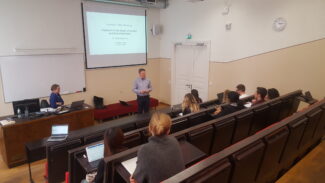 ra Axyonova from the Freie Universität Berlin gave an intensive training on “Fieldwork in the Study of Conflict and Authoritarianism”. The training covered questions related to conducting field research in international contexts, with a specific focus on non-democracies, post-conflict societies and areas of limited statehood, such as de facto states. Based on her experiences in post-Soviet Eastern Europe and Central Asia, Vera Axyonova gave an overview of research interview techniques, access strategies and data documentation and shared her personal insights into doing field research in challenging environments.
ra Axyonova from the Freie Universität Berlin gave an intensive training on “Fieldwork in the Study of Conflict and Authoritarianism”. The training covered questions related to conducting field research in international contexts, with a specific focus on non-democracies, post-conflict societies and areas of limited statehood, such as de facto states. Based on her experiences in post-Soviet Eastern Europe and Central Asia, Vera Axyonova gave an overview of research interview techniques, access strategies and data documentation and shared her personal insights into doing field research in challenging environments.
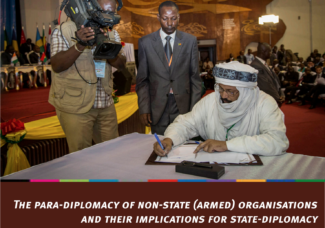 Eiki Berg attended a conference on The Para-Diplomacy of Non-State (armed) Organizations and their Implications for State-Diplomacy, organized by Université libre de Bruxelles/ REPI, on January 23-25, 2020. The conference discussed the political implications of non-state organizations’ and actors’ international practices. It included diverse scholarship on a wide range of themes relating to non-state actors, political-military organizations, and de facto states.
Eiki Berg attended a conference on The Para-Diplomacy of Non-State (armed) Organizations and their Implications for State-Diplomacy, organized by Université libre de Bruxelles/ REPI, on January 23-25, 2020. The conference discussed the political implications of non-state organizations’ and actors’ international practices. It included diverse scholarship on a wide range of themes relating to non-state actors, political-military organizations, and de facto states.
Eiki Berg presented a paper– Unpacking agency: How much power de facto states are able to exert?– which examined how secessionist states can enter international spheres, manage agency while negotiating status, and navigate role positions and subsequent power structures.
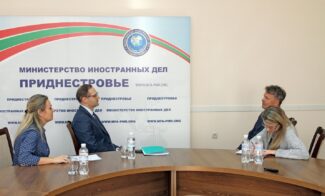 On December 5, 2019, the Transnistrian FM Vitaly Ignatiev was interviewed by Eiki Berg, and his colleague Kristel Vits. The scholars showed an interest in a wide range of topics, including Transnistrian trade with the EU, certain aspects of relations with the Republic of Moldova, and the geopolitical context of the Moldovan-Transnistrian settlement process. Political and legal prerequisites for the Transnistrian state formation were also part of discussion. Vitaly Ignatiev stated that Transnistria is currently in a special trading regime with the EU since January 1, 2016. “We had separate negotiations on optimal export regime of our goods to the EU market in the period of 2012-2015,” he emphasised. Unlike Moldova and Ukraine, Transnistria did not take any political obligations, he said. “At the same time, we tried to make the trading framework mutually beneficial,” the diplomat added.
On December 5, 2019, the Transnistrian FM Vitaly Ignatiev was interviewed by Eiki Berg, and his colleague Kristel Vits. The scholars showed an interest in a wide range of topics, including Transnistrian trade with the EU, certain aspects of relations with the Republic of Moldova, and the geopolitical context of the Moldovan-Transnistrian settlement process. Political and legal prerequisites for the Transnistrian state formation were also part of discussion. Vitaly Ignatiev stated that Transnistria is currently in a special trading regime with the EU since January 1, 2016. “We had separate negotiations on optimal export regime of our goods to the EU market in the period of 2012-2015,” he emphasised. Unlike Moldova and Ukraine, Transnistria did not take any political obligations, he said. “At the same time, we tried to make the trading framework mutually beneficial,” the diplomat added.
As related to prospects for the Moldovan-Transnistrian conflict settlement, Vitaly Ignatiev pointed out, “the de facto settlement vector has already been defined,” within 30 years, Transnistria has developed into a state-like entity. “Therefore, I’m sure it is necessary now to create conditions to solve the conflict, moving progressively on a “simple-to-complex” basis, eliminating restrictions and blockage elements, solving problems in the interests of people,” he concluded.
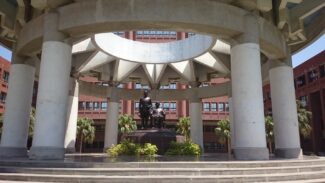 On November 10-22, 2019, Eiki Berg made a research visit to Kaohsiung in order to meet Taiwanese scholars working on Taiwanisation topic. His travel to initiate a research on The role of Identity in Legitimizing National Policies in Taiwan received financial support from Estonian Research Council and Taiwan Ministry of Science and Technology. He received a warm welcome from the hosting National Sun Yat-sen University and its distinguished scholars: Prof Chueiling Shin, Prof Liao Da-chi, Prof Cheng-Shan Liu and Assoc. Prof Rou-lan Chen. During this two-week visit, parties managed to move further with the idea of a joint research project that can be initiated by UT and NSYSU. As somewhat modified, compared to the initial “set of ideas,” this research visit enabled the formulation of a clearer picture about the research objectives and methodologies. After several discussion rounds they came to the conclusion that the research focus will be set on the national policies which a) seek security against Mainland China (i.e. relations with US); b) enable controlled interactions with Mainland China (cross-strait relations); c) facilitate strong links with allies and like-minded states, enhance contacts with international organizations and non-state actors (foreign policy and public diplomacy); d) center on international trade (economic diplomacy).
On November 10-22, 2019, Eiki Berg made a research visit to Kaohsiung in order to meet Taiwanese scholars working on Taiwanisation topic. His travel to initiate a research on The role of Identity in Legitimizing National Policies in Taiwan received financial support from Estonian Research Council and Taiwan Ministry of Science and Technology. He received a warm welcome from the hosting National Sun Yat-sen University and its distinguished scholars: Prof Chueiling Shin, Prof Liao Da-chi, Prof Cheng-Shan Liu and Assoc. Prof Rou-lan Chen. During this two-week visit, parties managed to move further with the idea of a joint research project that can be initiated by UT and NSYSU. As somewhat modified, compared to the initial “set of ideas,” this research visit enabled the formulation of a clearer picture about the research objectives and methodologies. After several discussion rounds they came to the conclusion that the research focus will be set on the national policies which a) seek security against Mainland China (i.e. relations with US); b) enable controlled interactions with Mainland China (cross-strait relations); c) facilitate strong links with allies and like-minded states, enhance contacts with international organizations and non-state actors (foreign policy and public diplomacy); d) center on international trade (economic diplomacy).


